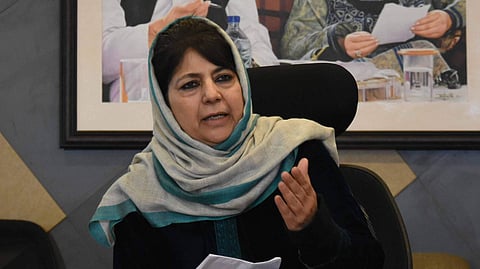

SRINAGAR: PDP chief and former Jammu and Kashmir Chief Minister Mehbooba Mufti on Monday met Lt Governor Manoj Sinha at Rajbhavan, seeking dignified return and rehabilitation of migrant Kashmiri Pandits.
It was her first meeting with Lt Governor Sinha after he took over as Lt Governor of J&K UT in 2020.
Mehbooba visited the Rajbhavan in the morning today and held deliberation with Lt Governor on key issues concerning J&K including the recent cross border shelling in which 18 civilians were killed.
The PDP chief during her deliberations with Lt Governor sought return and rehabilitation of migrant Kashmiri Pandits and handed over a proposal to LG on the return and rehabilitation of Pandits. She handed a copy of proposal on return and rehabilitation of Pandit to LG Sinha. She has also sent the copies to Home Minister Amit Shah and Chief Minister Omar Abdullah.
The Pandits migrated enmasse from the Valley after eruption of militancy in 1990 and are now living in Jammu, Delhi and other parts of the country.
As per MHA report, by 2020 the number of displaced Kashmiri Pandit families had risen to 64,951 with 43,618 families living in Jammu, 19,338 families in Delhi and 1995 families in other states and UTs.
In her proposal to LG, Mehbooba emphasised an all-stakeholders approach, ensuring that any policy or plan pitched is rooted in empathy, mutual trust and most importantly, the on ground realities.
“The government should initiate a dialogue driven process involving representatives from the community, civil society, local leaders and relevant administrative agencies. Only through inclusive deliberations can we chart a future where no community feels alienated in their own land,” she said.
In her letter to LG, Mehbooba has said the return of KPs is not merely a demographic or administrative concern — but stands as a matter of historical justice, reconciliation and the restoration of Kashmir's pluralistic ethos.
“Reintegration must be both materially grounded and socially sustainable, requiring a multi-tiered and inclusive approach,” she said.
According to Mehbooba, the return of displaced individuals must be anchored in a sense of security for government employees who play a critical role in rebuilding community confidence.
“Develop and maintain a comprehensive zonal risk assessment map of the Kashmir that clearly identifies high, moderate, and low-risk areas. Use this mapping to align government postings with individual safety preferences,” she said.
The PDP chief said every displaced Kashmiri Pandit family should be allotted half a kanal of state land in their district of origin, contingent upon their willingness to return.
“For families whose original homes still exist but are in dilapidated or semi-damaged condition should be provided targeted financial grants or interest-free loans for structural repairs and modernization. A technical support team should also be made available to inspect, estimate and certify necessary restoration work,” she said.
Mehbooba said sustainable return cannot be achieved without political empowerment. “The displaced Kashmiri Pandit community must have a formal role in shaping the region's democratic future.”
“Replace the current nomination-based system with two reserved constituencies in the Jammu & Kashmir Legislative Assembly especially for Kashmiri Pandits residing in or originally from the Kashmir Valley. This would provide direct electoral representation, allowing the common populace to elect Kashmiri Pandit as their representatives,” she said.
She also said rehabilitation must go beyond physical return, but must actively rebuild the human and emotional bridges disrupted by decades of separation and mistrust.
The government, she said, should organise an annual multi-day summit bringing together displaced Kashmiri Pandit families, local communities, government officials, civil society organisations and academic experts to discuss challenges in return and integration and develop collaborative solutions and community-led action plans.
The PDP chief said a Reconciliation and Reintegration Commission (RRC) should be established to coordinate all return, rehabilitation, and reintegration efforts across departments. It should function as an independent grievance redressal authority, with quasi-judicial powers to resolve land disputes, benefit, and complaints of discrimination.
“The reintegration of Kashmiri Pandits must not be viewed merely as a symbolic return to their ancestral homes, but rather as an opportunity to build a shared, inclusive and forward-looking future for Jammu and Kashmir. It represents not only the restoration of a displaced community's rights and dignity, but also the revitalization of the region's pluralistic heritage, that once stood as a testament to coexistence, harmony and cultural richness,” she said.
“This roadmap presents a series of balanced, actionable and empathetic policy recommendations that aim to facilitate this reintegration through a multidimensional approach, addressing the needs of returnees and the sensitivities of the existing population,” added Mehbooba.